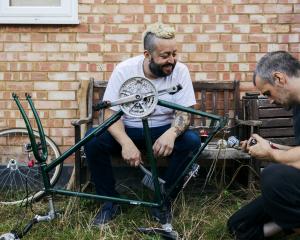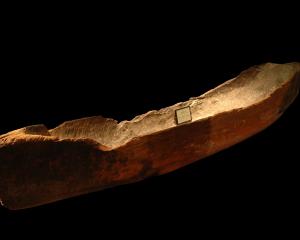The photo shows a great number of people aboard a Dunedin cable car.
But what the photo is unable to communicate is the part cable cars played in the lives of everyday commuters.
For that, it takes a reporter with first-hand experience.
"It could be cold and miserable clinging to the outside of a cable car ... But for all the discomfort, the cars were popular ... There was always room for just one more and there was an atmosphere of friendliness and fellow-feeling on the cable cars."
The words of Otago Daily Times columnist Gordon Parry have been published in one form or another for 65 years.
But the author of more than 30 books considers himself less a writer than a "reporter".
"In my view a writer needs imagination and style. I have my own simple style (short words, short sentences) but am sadly lacking when it comes to imagination."
Mr Parry has just self-published a thousand copies of a little booklet he is selling around the town.
It contains recollections of the "six o'clock swill", encounters with prime ministers, royals in residence at the Dunedin Club and Saturday nights "at the pictures".
Mostly, it is anecdotal and light-hearted.
But, Memories at 90 also refers to a family tragedy which Mr Parry says has "haunted" him since 1955 when his wife, Helen, first became ill with rheumatic fever.
"But if I had sought a second opinion when worried about her condition, a crisis might have been averted.
"The fact that our doctor was a family friend inhibited me.
"Had I persisted and insisted, 40 years of pain and a succession of major problems, including some heroic surgery, might have been avoided. The guilt has never gone."
Mr Parry vows to complete a biography of his wife, who died 14 years ago.
They first met when he returned from World War 2 and secured his first journalism job at the Greymouth Star.
The couple came to Dunedin where Mr Parry worked on the ODT from 1947 until 1964. Since then he has worked for the University of Otago, written several company histories and still contributes his Memory Lane column to the paper.
Mr Parry is somewhat mystified about where the detail for his column comes from. He does not use a diary and makes no great claim for his memory.
"I'm like you. If you asked me what I did last Thursday, I wouldn't have a clue.
"But I do seem to store things away. I'm still a reporter I think, and I see something and it reminds me that years ago something else happened.
"Also, I think what pushes me on is the fact that so many people say to me 'oh gosh, that was great. It reminded me ...'
"What I'm trying to do is remind people and it seems to work.
"Mind you, I'm probably wrong sometimes. But who's going to argue?"
One of the highlights of Mr Parry's ODT reporting career was the year he spent in England as a Kemsley scholar.
But taking a three-week break at the end of the year, to visit family before returning to work, did not go unnoticed at the ODT.
"The ODT had paid me 2 a week while I was away to make sure I came back.
"And when I did come back ... the accountant called me in and said 'Mr Parry, it's come to my attention that you got back from England but you didn't come straight back to work ... of course you owe us 6.'
"And it was duly deducted."
Mr Parry's first editor at the ODT was John Moffett who Mr Parry described as "a very impressive sort of character, but not a very good newspaper editor".
"Of course he had a very dominating wife and sometimes he would say "a" in the morning and "b" in the afternoon, if he had been home for lunch."
He credits an English sub-editor called Alan Moyle with transforming the layout of the ODT when it first began publishing news, rather than advertisements, on the front page.
"The only trouble was, he developed an enthusiasm for politics. He was on the verge of being nominated as a National Party candidate when it was discovered, shock horror, that the very nice lady he was with was not his wife. He had a wife back in England. So that was the end of him.
"He certainly livened everything up, and I was his loyal subject because I liked short sentences and I liked snappy things. I didn't like long-winded pretentious gunk."
Mr Parry reserves a special loathing for advertising supplements.
"I simply detested working on supplements. I reckoned that the newspaper was prostituting itself. I was pretty staunch about that sort of thing."
Working conditions at the ODT, when it was in the now demolished building at the bottom of Burlington St, were "pretty average".
Reporters were required to provide their own portable typewriters - "my first one cost me 25, which was five weeks' wages" - and because chairs were never the right height, reporters would use a stack of newspapers as a cushion.
"It wasn't very good for light grey trousers, I can tell you."
Mr Parry said he had only been there a few weeks when he "led a strike" over the standard of lighting in the reporters' room.
"We had about half a dozen dangling light bulbs and I found my eyes were getting very tired when I was working at night.
"I asked for an improvement and nothing happened.
"Eventually I rallied the troops a bit and said we weren't going to work in these conditions any longer and within a month we had strip-lighting. So I did something for the troops.
"I was a bit of a rebel, perhaps."
Mr Parry was president of the Dunedin Journalists' Union at one time.
"It wasn't a very strong union and we were not very well-paid either. Never have been. If you are a journalist you just don't expect to make any money."
There were no women reporters when Mr Parry began at the ODT apart from "a dear little soul" who was the women's page editor.
"And when we did get women on the staff, and I was chief reporter, I would never have sent a girl to the court because of what she might hear down there.
"We were very protective.
"First of all we didn't want them. Then when we got them, we were very protective of them and tried to shelter them a bit.
"They probably laughed like a drain behind our backs, you know."
Mr Parry applauded the role the ODT played in the recent campaign to retain neurosurgical services in Dunedin.
"The ODT was always a crusading newspaper. It would sleep for a long time and then suddenly wake up and pick up the cudgels and lambast people."
Mr Parry said the paper had taken a "strong lead" in debates over the proposed aluminium smelter for Aramoana and threats to cardiac services.
"I must say this though. The ODT was always a very fair newspaper. It always gave both sides. The editorial might thunder, but in the news columns everybody got a fair deal. I've always had a very high regard for this newspaper."
And what of that obituary that will eventually have to be written?
"My guess is that it will begin something like this: 'The death occurred yesterday of the doyen of Dunedin writers ... ' But, to be honest, I regard myself as a reporter rather than a writer."
'Memories at 90'-
Thought's on death and dying
Suddenly at about 2am she stirred and asked, "Am I dying?"
In as matter-of-fact tones as I could muster I replied, "Yes, I think so dear."
No further word was said until 20 minutes later. "Sorry to be so slow," said Helen.
Those few words indicated two things - acceptance and consideration for others. She was ready to go but didn't want to be a nuisance. I suspect that most people as they near the end act in similar fashion. This is encouraging for those left behind. Death is a door through which all of us will pass and it helps to know that it opens easily and closes quietly.
I have always maintained that I am not afraid of death, but I am not quite so positive about the dying process. Having seen agonising death and undignified death I have always hoped that my passing would be quick and easy ...
Reunion? An after-life? A fortunate few have an unquenchable faith in the ultimate reunion of loving hearts. The rest of us wonder and hope or simply dismiss the idea.
Now that I am in my tenth decade it can't be all that long before I find out. The curious thing is that I don't really feel old. There are health problems. I walk neither as far nor as fast as I used to, but I continue to think that 90 is just another number.












